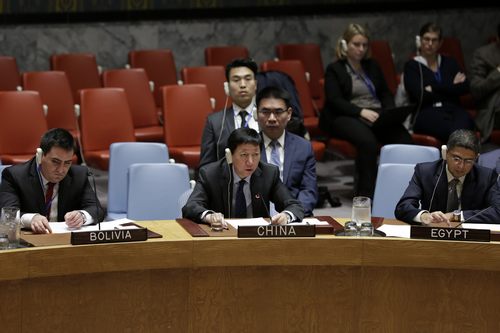| Statement by Ambassador WU Haitao at the Security Council Briefing by the United Nations High Commissioner for Refugees |
| 2017-11-02 05:38 |
|
China condemns the terrorist attack that took place in New York and expresses its condolences to the victims. We appreciate the efforts of the French presidency and congratulate Italy on its assumption of the presidency. China thanks Italy for convening today’s meeting and welcomes the Under-Secretary of State for Foreign Affairs of Italy, Mr. Vincenzo Amendola, who has come to New York to preside over this meeting. We also thank the United Nations High Commissioner for Refugees, Mr. Filippo Grandi, for his briefing. The situation of refugees around the world continues to deteriorate. Armed conflicts and natural disasters have resulted in an increase in the number of internally displaced persons. Refugee issues are complex and have many underlying causes, and have become protracted and hybrid in nature. Factors such as terrorism, turbulent regional situations and mixed flows of refugees and migrants have added to the difficulty of providing refugees with protection. Over the past year, the Office of the United Nations High Commissioner for Refugees (UNHCR), under the leadership of High Commissioner Grandi, has actively pushed for internal reforms, intensifying its coordination efforts and improving its emergency response capacity, thereby making significant contributions to protecting the welfare of refugees and responding to refugee crises. China appreciates all those efforts and supports the Office in maintaining its positive role in that regard. Faced with the complex refugee situation and related challenges, the international community should continue to work within the framework of international law, including the 1951 Convention relating to the Status of Refugees and its 1967 Protocol, and on the basis of mutual respect. Enhanced international cooperation will create synergy in addressing the global refugee problem. The issue requires tackling both the symptoms and root causes by increasing support and assistance to host countries and communities, and eliminating discrimination against and prejudice towards refugees. We must also focus on the root causes that give rise to refugees by peacefully settling disputes through dialogue, increasing development aid to countries in need of assistance, creating the necessary conditions for the return of refugees to their homes, and promoting ongoing development in their countries of origin. In handling matters related to refugees, the international community should uphold the principles of objectivity and neutrality, avoid interference in the internal affairs of the countries in question and prevent the politicization and abuses of international refugee protection mechanisms. China has long cooperated with UNHCR. In June, High Commissioner Grandi made a successful visit to China, where both sides achieved firm consensus on deepening our ties of cooperation. Pursuant to the outcomes reached at the Belt and Road Forum for International Cooperation in May, China will work with the relevant international organizations in a joint push to implement a tranche of international cooperation projects for countries along the Belt and Road, including providing food, tents, prefab buildings and other refugee relief items to those countries; establishing refugee scholarships; and financing the participation of refugee athletes in international and regional competitions. During the leaders’ round of the Forum, the Ministry of Commerce of China also signed a cooperation agreement with UNHCR, whereby it pledged $8 million to the Office as an appropriation to the United Nations Fund for South-South Cooperation. China will earnestly honor and effectively implement the aforementioned assistance initiatives. China is ready to work with all parties in actively participating in the intergovernmental negotiations on a global compact on refugees, to be launched next year, so as to contribute to the improvement in the global governance of refugees. The issue of Rakhine state of Myanmar involves complex historical, ethnic and religious factors. Many differences and contradictions have been brewing for a long time. The Government of Myanmar is now working actively to ease the tensions in Rakhine state, and the situation there is now moving towards stability. Myanmar and Bangladesh are now seeking a settlement of the problem of the Rakhine state through bilateral negotiations and consultations. The United Nations and the international community should remain patient and provide constructive help and cooperation to Myanmar by working together for an appropriate solution to the problem. |
| |||||||||||||
| |||||||||||||
